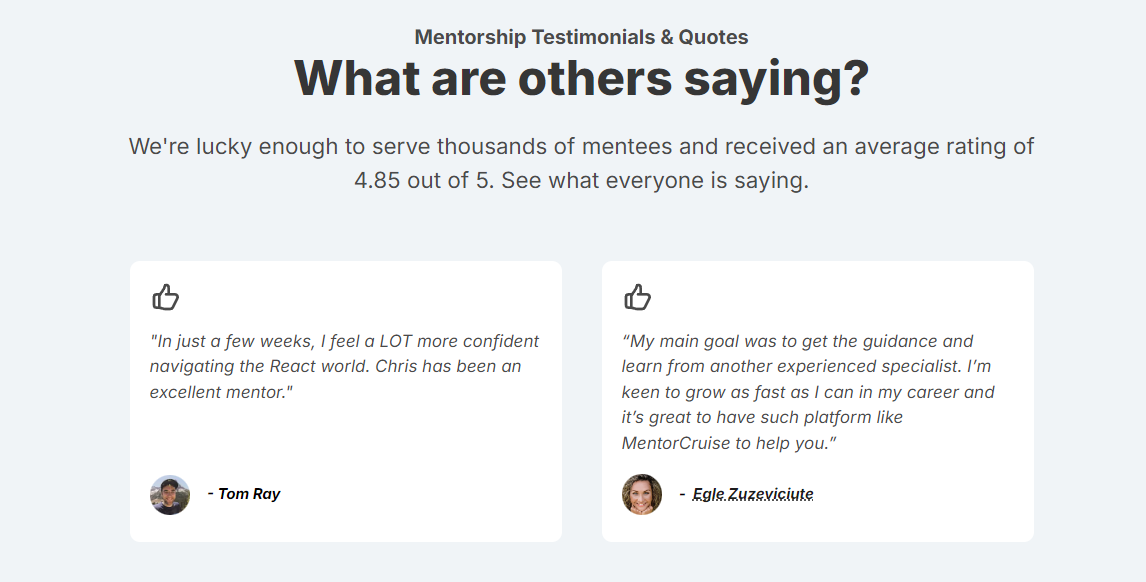Helpful Summary
- Overview: This guide discusses the best practices and necessary steps to create an effective and realistic personal career map.
- Why you can trust us: Our mentors have helped many individuals unleash their full potential and achieve their career goals. Mentors like Giuseppe Santoro, Gonçalo Palma, and Jordi Scharloo show how our mentorship program improves the careers of professionals across different industries.
- Why this is important: Understanding the career mapping process is essential to ensure your career moves in the right direction.
- Action points: We recommend learning this guide by heart so you can consistently assess your skills properly, set realistic goals, and create a solid and structured career map for your future.
- Further research: We invite you to explore MentorCruise to find a personalized mentorship program that can help advance your career. We have over 2,000 mentors available, including leaders from Amazon, Airbnb, Netflix, and other leading companies worldwide.
With a career map, you can identify long-term career objectives, evaluate current skills and interests, explore potential career paths, and create a plan to acquire professional skills and experiences.
In this MentorCruise article, we will share our best tips to help anyone develop an effective career map. The result? Bringing you one step closer to a successful and fulfilling career.
Why Listen To Us?
Here at MentorCruise, we have helped professionals and entrepreneurs achieve success in their respective fields by providing actionable steps and personalized mentorship programs that align with their career goals.
From Miky Bayankin's guidance on product development to the case of Nelson Remetz's successful career transition, our case studies reveal how our platform can positively impact your career.
Sounds too good to be true? Our testimonials speak for themselves!

We also have an average rating of 4.5/5 on Trustpilot and a 4.9/5 rating on Product Hunt.
What is Career Mapping?
Career mapping is the process of self-assessment to identify your current professional standing, hence, recognizing the best steps you need to take to advance your career.
In the simplest terms, it's about making a plan for the future of your career, keeping in mind your current skills, your main interests, and the things you need to do or learn to achieve your desired career outcome.
Benefits of Career Mapping
Get clarity
A career map will help you identify the best career paths to take so you can set realistic short-term objectives on what you need to do to achieve your long-term professional goals.
Let’s consider Clara’s journey to becoming a web developer.
Clara knew that self-study could only take her so far. After doing some career planning, she realized what she needed to do. She decided to get a mentor.
Clara found Sandrina on MentorCruise and the two couldn’t have been a better match. Sandrina showed Clara exactly what she needed to do for her career and showed her the right way to become a successful web developer.
Focus on the right things
Struggling to figure out what to do next?
Career mapping will help you prioritize the most crucial tasks you need to accomplish to advance your career.
For example, with a career map, you can ascertain if you need to learn a new skill or enhance an existing one to achieve a certain career milestone.
Personal growth
Career mapping encourages self-reflection, which in turn helps you recognize your strengths and embrace your weaknesses.
A career map helps you identify the most useful skills while at the same time, revealing what you are lacking so you can align your career path accordingly.
Stay motivated
With a clear career path ahead of you, you can take advantage of your passion and interest and use it to keep moving forward.
Pursue new career opportunities
A career map will help you gain crucial insights into your skills, values, and interests to help you decide whether you should stick to your current field or consider a career change.
How to Create a Career Map?
A wise man once said: Many people know how to set goals, but few know how to achieve them.
So, with this in mind, below is a detailed guide to creating a realistic and effective career map to achieve your desired career goals.
- Self-assessment and reflection
Understanding yourself is the first step to creating an effective career map. By truly understanding your skills and interests, you will be able to set sustainable career goals.
Furthermore, self-assessment and reflection will enable you to identify your strengths and embrace your weaknesses, which will give you a clear idea of what you’re good at and what you enjoy doing.
This in turn will allow you to set realistic goals and action plans that coincide with your abilities and career aspirations.
- Research and explore
After you’ve thoroughly established what you’re good at, what you like doing, and what you want to achieve professionally, it’s time to find the most suitable career.
For instance, if you like working with numbers, consider a career in accounting and sales.
If you are tech-savvy and you like working with computers, then the best career path for you would be to work in the tech industry.
Research different career opportunities and don’t be afraid to explore various industries that fit your skills, interests, and aspirations.
Speaking of career opportunities, here are some career paths in the tech industry that might interest you.
- Identify the skills and qualifications for your desired career
As you may already know, different careers require a different set of skills and qualifications. See to it that your chosen career aligns with your current skills and abilities.
If not, you will have to come up with a plan to learn the necessary skills for your desired career path.
Additionally, you should also be prepared to enhance your existing skills and meet certain requirements for the profession you want to pursue.
- Create a clear career roadmap
Now that you have a clear career you want to pursue in mind, it's time to take action.
Create a step-by-step plan on the things you need to do to accomplish your career goals. Break down your goals into simple tasks and set deadlines for completing a certain task.
We advise you to use the SMART method to do this:
S - Specific
M - Measurable
A - Achievable
R - Relevant
T - Timebound
The career goals you set should align with your desired career outcome whilst considering your level of skills, values, and interests.
Don’t forget to outline both short-term and long-term career goals, along with the specific actions you need to take to complete each goal.
- Take action according to your career roadmap
Implement your career plan as you have designed in your career road map. Make it a habit to review your performance and compare your progress to your roadmap. Do this at least once a month.
Stay flexible and be open to adjust your plan as you go.
- Seek advice and feedback
Two heads are better than one. Hence, never be ashamed to seek advice from friends, family, peers, colleagues, and mentors to gain fresh perspectives on your career map.
The best person to ask is a career planning mentor, of course.
Consider a situation like Kyle's. Kyle was a software developer who wanted to use his skills to transition into a software engineer.
He decided to pursue his new career goal by talking to one of our mentors at MentorCruise. With the help of his mentor Hossam, Kyle went from a programming beginner to a hired engineer!
Best Practices for Career Mapping
Make no mistake, career mapping is a delicate matter that should not be taken for granted. As we have mentioned earlier, setting goals is easy; making them come true is a different story.
With this in mind, here are the most important things to consider when creating a sustainable and effective career map.
Be honest with yourself
Self-acceptance is necessary if you wish to create an effective and reliable career map. By embracing both your strengths and weaknesses, you will be able to grow and equip yourself with the right skills and knowledge for your desired career.
Set realistic goals
There is no shortcut to success. Accept that good things will take time and setting clear/achievable goals is necessary so you stay aligned with your long-term career objectives.
Do your due diligence
Do proper research on various industries and career opportunities to make informed decisions before choosing a specific career path. This will help you prepare properly for possible obstacles and challenges that might come with your chosen career.
Ask for guidance
Seek advice from people and mentors in the field you want to pursue a career. Ask about their experience working in the industry and what advice they can give to a newcomer like you.
Conclusion
Proper career mapping is key to opening the doors to a more successful and fulfilling career.
By following our steps, you can create a comprehensive career map to guide you toward a successful and fulfilling career path.
Sometimes, you need a second opinion, though. In that case, you should work with someone who specializes in career progression, and start browsing our mentors to find the right fit for your career aspirations!







